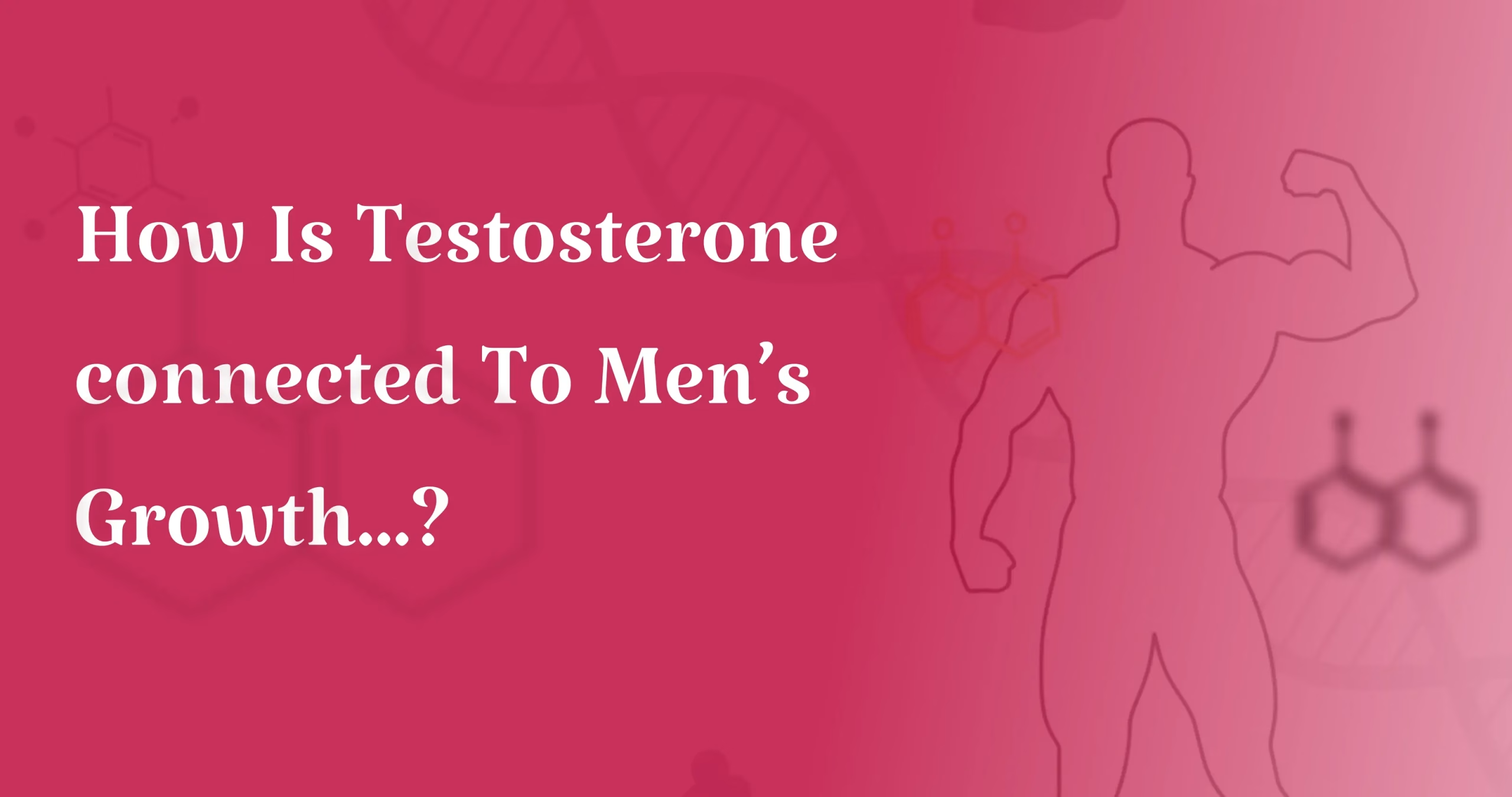Testosterone is a vital sex hormone present in both men and women, but it plays a dominant role in male development. In men, testosterone is responsible for building masculine traits, supporting reproductive health, and influencing overall well-being.
During puberty, testosterone drives key physical changes, including the growth of the penis and testes, deepening of the voice, and the development of facial and body hair. It also contributes to muscle growth, bone density, sperm production, and sexual desire.
- Why Testosterone Is Important for Male Well-Being
- Extra Benefits of Healthy Testosterone Levels
- What Happens When Testosterone Levels Drop?
- Symptoms of Low Testosterone in Men
- Symptoms of High Testosterone in Men
- Key Takeaway
- How to Maintain Healthy Testosterone Levels Naturally
- When to Seek Medical Advice
- Conclusion
- FAQS
Testosterone is produced primarily in the testicles, with its production regulated by the pituitary gland in the brain. The body synthesizes testosterone from cholesterol, but this doesn’t mean that eating high-cholesterol foods will increase levels. In women, testosterone is produced in smaller amounts, mainly in the ovaries and adrenal glands.
Testosterone levels peak during adolescence and early adulthood and gradually decline after the age of 30–40. Maintaining optimal levels is important for physical performance, sexual health, and mental well-being.
Why Testosterone Is Important for Male Well-Being
In men, healthy testosterone levels are linked to:
- Development of the penis and testes
- Deepening of the voice during puberty
- Facial, body, and pubic hair growth (also linked to balding patterns)
- Muscle size and strength
- Healthy sex drive (libido)
- Sperm production and fertility
- Stable mood and mental clarity
- Bone density and growth
- Cognitive abilities such as memory and focus
Learn more: Low Testosterone in Men: Causes, Symptoms, and Treatment Options
Extra Benefits of Healthy Testosterone Levels
When testosterone levels are balanced, men may experience:
- Better heart health and improved blood circulation
- Reduced body fat and better weight management
- Increased muscle mass and strength
- Stronger bones and reduced risk of fractures
- Improved mood and reduced risk of depression
What Happens When Testosterone Levels Drop?
A decline in testosterone, known as low testosterone or male hypogonadism, can significantly impact health. Low testosterone may result from:
- Genetic conditions (e.g., Klinefelter syndrome)
- Pituitary gland disorders
- Testicular injury or trauma
- Autoimmune diseases
- Chronic illnesses such as kidney disease, liver cirrhosis, or HIV/AIDS
- Side effects of cancer treatments, like chemotherapy or radiation
- Excessive exercise, poor nutrition, alcohol abuse, or anabolic steroid misuse
Symptoms of Low Testosterone in Men
- Reduced sexual performance and low libido
- Erectile dysfunction
- Fatigue and lack of energy
- Loss of muscle mass and strength
- Increased body fat and weight gain
- Thinning body and facial hair
- Mood changes, depression, or irritability
- Weak bones and higher fracture risk
- Low sperm count and fertility issues
Symptoms of High Testosterone in Men
Men with elevated testosterone levels may experience:
- Aggressive or irritable behavior
- Increased acne and oily skin
- Excessive muscle mass growth
- Higher risk of sleep apnea
- Infertility due to reduced sperm production
- Frequent headaches
- Heart complications and cardiovascular strain
- High blood pressure
- Increased appetite and weight fluctuations
- Swelling in the legs or feet
- Mood swings and emotional instability
- Enlarged prostate (increasing urinary issues)
also read: Common Male Sexual Disorders: What is Sexual Problems?
Key Takeaway
Testosterone plays a critical role in male growth, development, and overall health. While a natural decline with age is expected, significant drops in testosterone can cause physical, mental, and emotional challenges. If you suspect low testosterone, consult a healthcare provider for diagnosis and treatment options such as testosterone replacement therapy, lifestyle changes, or medical interventions. Maintaining healthy testosterone levels can help men stay strong, active, and confident at any stage of life.
If left unmanaged, high testosterone can raise the risk of serious health conditions, including heart disease and reproductive problems.
How to Maintain Healthy Testosterone Levels Naturally
1. Regular Exercise
All forms of exercise can support healthy testosterone production, but weight training and high-intensity interval training (HIIT) are particularly effective for both short- and long-term hormonal balance.
2. Balanced Nutrition
A diet rich in healthy fats, lean protein, and complex carbohydrates supports hormone health.
- Caffeine and creatine monohydrate may help boost testosterone when paired with exercise.
- Limit junk food and excessive saturated fats, which can reduce sperm count and negatively affect hormone balance.
- Overweight men consuming high-fat diets often experience a drop in testosterone alongside mental and physical health decline.
3. Stress Management
Chronic stress increases cortisol, a hormone that can lower testosterone. Manage stress through mindfulness, relaxation techniques, and healthy lifestyle habits to prevent hormonal imbalance.
4. Adequate Vitamins and Minerals
Micronutrients are critical for testosterone production and sperm health:
- Vitamins D3, A, C, E, and B-complex support hormone regulation.
- Zinc is especially important for sperm quality, with research showing improvements of up to 74% in sperm function with proper supplementation.
5. Quality Sleep
Testosterone production peaks during deep sleep. Aim for 7–9 hours of quality rest each night to support hormone regulation, muscle recovery, and overall health. Even one week of poor sleep can lower testosterone levels by up to 15%.
When to Seek Medical Advice
If you suspect high testosterone—especially with symptoms like aggression, infertility, or cardiovascular issues—consult an endocrinologist or urologist. Treatment may involve adjusting medications, modifying lifestyle habits, or addressing underlying health conditions.
Explore more: Most Effective Erectile Dysfunction Pills for Men
Conclusion
Testosterone is a vital hormone that shapes male growth, development, and long-term health. From puberty through adulthood, it drives the development of reproductive organs, muscle mass, bone strength, and sexual function. Balanced testosterone levels not only support physical growth but also influence mood, energy, and cognitive performance.
Both low and high testosterone levels can disrupt this balance, leading to health issues ranging from reduced libido and muscle loss to cardiovascular risks and mood changes. Maintaining healthy testosterone levels through regular exercise, balanced nutrition, quality sleep, and medical guidance is essential for men’s overall well-being at every stage of life.
By understanding how testosterone impacts growth, men can make informed lifestyle and healthcare choices that help them stay strong, active, and healthy for years to come.
FAQS
1. What role does testosterone play in men’s growth?
Testosterone supports the development of reproductive organs, muscle mass, bone density, body hair, and sexual function. It also influences mood, energy levels, and cognitive health.
2. When do testosterone levels peak in men?
Testosterone levels typically peak during late adolescence and early adulthood (ages 18–25) and begin to gradually decline after the age of 30.
3. Can low testosterone affect physical growth?
Yes. Low testosterone can lead to reduced muscle mass, weaker bones, low energy, and decreased sexual health. In younger males, it can delay puberty and stunt normal development.
4. What causes low testosterone in men?
Common causes include aging, obesity, chronic illnesses, hormonal disorders, testicular injury, certain medications, and lifestyle factors such as poor diet and lack of exercise.
5. How can men maintain healthy testosterone levels?
Men can support healthy testosterone levels by exercising regularly, eating a balanced diet, getting enough sleep, managing stress, and seeking medical guidance when necessary.
6. Is testosterone replacement therapy safe?
Testosterone replacement therapy (TRT) can be safe when prescribed and monitored by a healthcare professional, but it may carry risks such as heart issues, mood changes, and fertility problems.
For More Details Visit: healthline.com, health.harvard.edu, medicalnewstoday.com
Disclaimer: This article is for informational purposes only. Consult a healthcare provider before using any medication.





